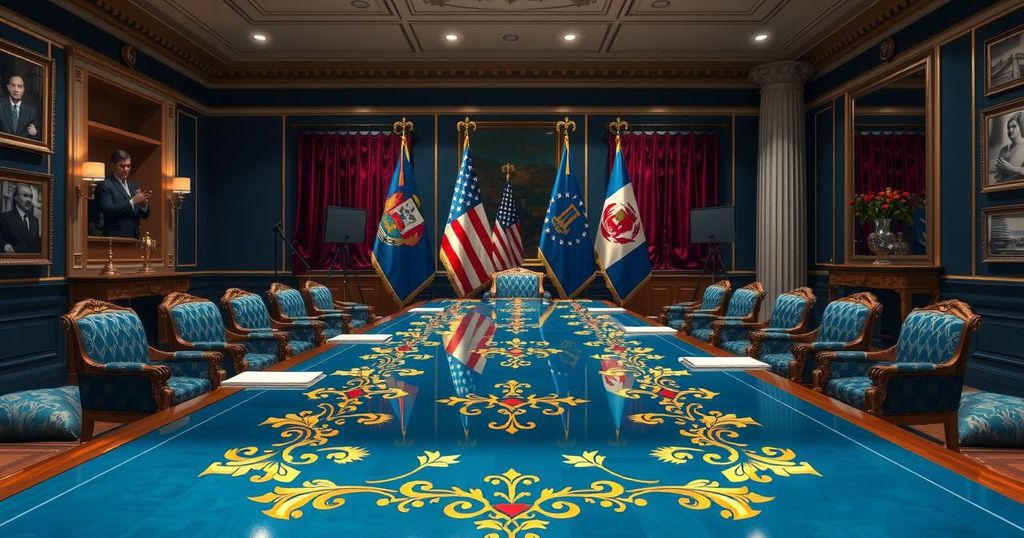Trump Confronts Ramaphosa on South African Farm Violence During Diplomatic Meeting

During a White House meeting, Donald Trump aggressively challenged South African President Cyril Ramaphosa on accusations of land seizures and violence against white farmers. Ramaphosa defended South Africa’s legal land reform process, emphasizing its intentions to address historical injustices. The diplomatic fallout from the encounter remains uncertain, with analysts warning of potential strains on U.S.-South Africa relations.
In an unexpected confrontation at the White House, former President Donald Trump challenged South African President Cyril Ramaphosa during a diplomatic meeting. This encounter evolved from a discussion focused on trade and regional security into a vigorous interrogation about allegations of land seizures and violence against white farmers in South Africa.
As the session commenced, the initial atmosphere seemed polite, yet sources familiar with the meeting indicated that it quickly deteriorated. This feeling was echoed by a diplomat stating, “It felt more like a set-up than a summit,” as Trump repeatedly pressed Ramaphosa on land reforms, citing conservative media reports.
During the exchange, Trump notably referenced past claims of state-sanctioned land grabs and violence, producing images from an American news site to bolster his accusations. He reportedly questioned, “Isn’t it true your government is taking land without compensation?” an inquiry that steered the meeting away from its intended diplomatic purpose.
In response, President Ramaphosa maintained a diplomatic stance, asserting that South Africa’s land reform process is legal, transparent, and focuses on correcting historical injustices rather than targeting specific racial demographics. “There is no state policy of confiscation. There is no campaign of killing,” he said, emphasizing South Africa’s framework as a constitutional democracy.
What lies behind the rhetoric? The assertions surrounding farm seizures and violence against white farmers lack substantial evidence. While the topic of constitutional amendments for land expropriation without compensation has stirred debate, there have not been large-scale confiscations. The reform effort aims to redistribute land primarily controlled by white South Africans due to apartheid’s discriminatory laws.
In terms of violence, statistical analyses show that both black and white farmers fall victim to crime, and while the murder rate for farmers is disproportionately high compared to the general populace, there is no conclusive evidence tying these murders to racially motivated campaigns.
Formerly, the U.S. Embassy in South Africa remarked in 2018 that there was no indication of an intentional assault against white farmers. Claims associating such crime to genocide have been thoroughly examined and discredited by multiple independent fact-checking organizations.
In the aftermath of this tense meeting, Ramaphosa’s team issued a cautious statement, indicating that the leaders engaged in a “frank exchange of views” and expressed a mutual commitment to ongoing dialogue. Meanwhile, Trump took to social media, proclaiming he had presented Ramaphosa with truths that mainstream media would ignore.
The diplomatic implications of this confrontation remain uncertain. Experts suggest that while this could resonate positively with Trump’s supporters, it poses a risk of harming U.S.-South Africa relations if not managed with care. After the meeting, Ramaphosa addressed media outlets, reiterating South Africa’s dedication to constitutional democracy and inclusive values, stating, “We remain committed to addressing our country’s challenges through democratic means.”
Commentators have labeled this meeting as entailing significant political theatrics, particularly for Trump, while putting President Ramaphosa in a challenging position. One observer remarked, “No one likes being called a liar to their face in front of the cameras.”
This encounter between Donald Trump and Cyril Ramaphosa highlights pronounced tensions surrounding South Africa’s land reform policies and farm violence allegations. While Trump’s aggressive questioning reflects a political strategy aimed at energizing his base, Ramaphosa’s diplomatic response underscores his administration’s commitment to constitutional democracy. The long-term ramifications of this exchange for U.S.-South Africa relations are yet to be determined, but it certainly raises questions about international diplomacy in the current political climate.
Original Source: www.thestkittsnevisobserver.com







